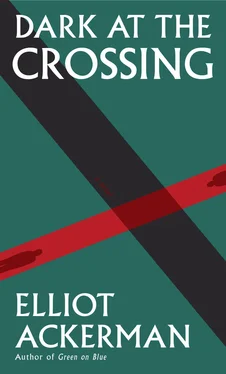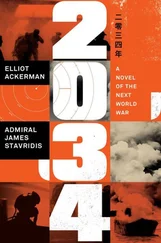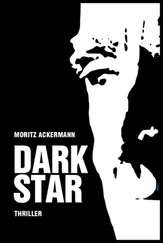A laugh escaped Haris.
Marty stopped working at his bag. His eyes fixed on Haris.
“He’s serious?” Haris asked Amir in Arabic.
“Damn serious,” replied Marty in flawless Arabic. He pulled a brush from his bag’s side pocket, running it through his longish blond hair. He turned to admire his reflection in a shopwindow for just a moment before putting the brush away. “Most of those kids are from the university,” he explained. “I teach English there on a Fulbright. Any retard can teach English. The Syria Analysis Group takes up most of my time.”
“Amir told me,” said Haris.
“About what,” asked Marty, “the Syria Analysis Group or retards teaching English?”
Haris laughed again. “The Syria Analysis Group.”
Marty took off his Minutemen jersey and put on a hoodie. He offered Haris a self-satisfied smile. The hoodie and smile reminded Haris of those determined Silicon Valley wunderkinds he’d seen in the movies or on the news, the ones who’d pledged to make their first billion before they turned thirty.
“The Fulbright gets me the visa over here,” said Marty. He cocked his head at Haris but spoke to Amir: “You didn’t mention he was Iraqi.”
“I’m American,” said Haris. “But yes, born in Iraq.”
“As I told you,” Amir interrupted, “Haris came here to fight.”
“I wanted to hear him tell me,” said Marty.
“I came here to fight,” said Haris, hoping the words might shut him up.
“Then why aren’t you fighting?”
Haris said nothing. Out on the rink, Marty’s hockey team finished the last of their drills. The players gasped for air, leaning heavily over their sticks. One by one they stumbled off the ice, their practice finished.
“My older brother fought in Iraq,” said Marty. “He was a cavalry officer.”
Haris nodded. “First Cavalry?”
“Yeah, you know them?”
“Of course.” said Haris. “Was he West Point?”
“No, Yale.”
“That’s impressive. Is he still in the Army?”
“Naw, got out,” said Marty. “He wants back in, but they won’t take him. He’s become sort of a screwup — fights in bars, speeding tickets, stuff like that. Damn Army’s a screwup factory. They take guys who aren’t screwed up, screw ’em up, then tell ’em they’re too screwed up to be part of the screwup factory.”
“Looks like you’re doing a bit better,” said Haris.
Marty laughed. “Yale wouldn’t even take me — in four generations, a first for my family — so I became a Minuteman. Three years out of college and I’m running a research organization, which I founded, and that has nearly two hundred thousand dollars of business under contract, and”—he popped his index finger in the air—“I am starting the first intramural ice hockey league in the history of the Ottoman Empire. So yeah, I’m doing a bit better. But you haven’t answered my question: If you came here to fight, why aren’t you fighting?”
Getting robbed at the border now seemed incidental to Haris, a matter of logistics. He didn’t want to explain it to Marty. His reasons for fighting continued to be reduced, one subsuming another. What had begun as guilt over Jim, a desire to redeem himself through Syria’s democratic struggle, an irrefutable cause, had distilled into a desire to help topple the regime, to return to the war because, like Jim, it’d become all he knew, his home. But words like the Free Army, the revolution, and places like Aleppo, Damascus, Azaz, had all become too large. A true cause, meaning an honest cause, must be personal, specific. Faced with Marty’s question, he knew he’d found one in what she asked of him.
“Before I leave to fight, I’ve promised to help Daphne with something,” said Haris.
Marty didn’t reply. Instead, he turned to Amir, to see his reaction to another man helping his wife. And it was Amir who explained everything — the robbery at the border, Daphne’s determination to search for Kifa, Saied’s offer to help them cross, the five thousand dollars they would need, and the reason why Marty should give it to them: “It’s been months since the Syria Analysis Group has had a credible report on conditions in Aleppo,” said Amir.
“What about that kid you get interviews from — Jamil?” asked Marty. “You saying he and his little buddies aren’t credible?”
“They are, but Jamil’s stuck at the border. His information is secondhand.”
“Five thousand dollars is a lot of money,” said Marty.
“Firsthand reporting out of Aleppo is worth more than five thousand dollars.” Amir froze his eyes on Marty’s. “You know that.”
“Why don’t you take her?” asked Marty.
Amir stood to walk away. Before Haris could grab him, Marty did, pulling him back down onto the bench by the wrist. And Haris realized that Amir and Marty relied on each other for the research they did, and for their livelihoods.
“You’ve known him for what, two days?” asked Marty.
“Three.”
“Three,” Marty repeated.
He appraised Haris as if he were a valuable painting of questionable authenticity. Whatever connection they’d formed through their discussion of ice hockey, Iraq, and Marty’s brother dissolved with the discussion of money. “How do you know he’s trustworthy?” Marty asked Amir, speaking as if Haris no longer sat between them on the bench.
“Daphne thinks he is.”
“Daphne,” answered Marty, rolling her name in his mouth like a peppermint. “How come you never bring her by?” Before Amir could answer, Marty turned toward Haris. “Your friend has the loveliest wife I’ve ever seen, but whenever he comes by the office he’s always with someone else. Amir, what was the girl’s name from the other night?”
“Latia.”
“Yes, Latia,” said Marty. “He could be at home with Daphne, but he stays at the office with Latia.”
“Are you interested in helping or not!”
As he watched Amir’s frustration, a grin curled up one corner of Marty’s mouth. “I’m interested,” he said in a flat, measured tone. “I’m writing proposals for two new pieces of business, one with the Norwegian government, one with the Swedish. The proposals are due in three weeks.” He now spoke directly to Haris: “If you get to Aleppo and back by then, I could reference your report in the proposals. That has value. Whatever Daphne does, and if you choose to fight afterward, it’s not my business.”
“So you’ll give us the five thousand?” asked Haris.
Marty stood, indicating their meeting was over. He shouldered his hockey bag. “I’ll front you the money,” he said, “but if you don’t bring back my report, Amir’s on the hook for it.”
Haris glanced at Amir, unsure how he’d accept his indenture as collateral.
Amir immediately shook on the deal with Marty. Seeing this resolve, Haris realized Amir was already indentured, to Daphne — he was her husband. This deal seemed to offer Amir hope. Perhaps she would return from Aleppo changed, her pain eased.
Marty offered his hand to Haris. As they shook, he pulled Haris close, so only their shaking palms divided their chests: “I want that report, but that’s not why I’m helping you.” Marty’s oafish grip clamped hard on Haris’s. Amir wandered toward the ice rink, giving them enough space to speak privately. “You remind me of my brother,” whispered Marty. “That’s why, so don’t screw up.”
Marty let go of Haris’s hand. He called after Amir: “I’m having a get-together at the office tonight. Bring Daphne by, won’t you?”
With little conviction, Amir thanked Marty for the invitation. He said he might stop in, but Daphne probably wasn’t up for it.
“All right, fair enough,” said Marty, “but I really want you to think about one other thing. And I’m serious on this point.”
Читать дальше












